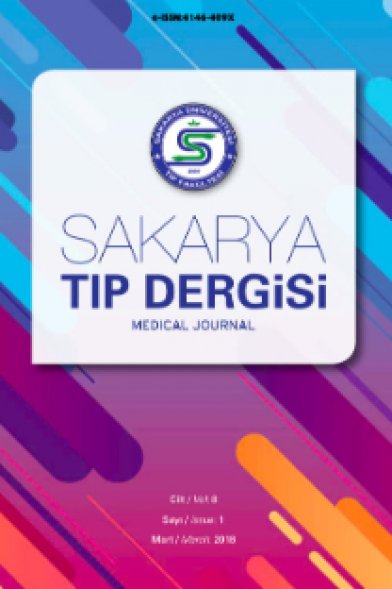How we treated a kidney transplant recipient who was receiving sirolimus during the SARS-CoV-2 pandemic? primum non nocere”
COVID-19, Kidney transplantation, , Sirolimus
How We Treated a Kidney Transplant Recipient Who Was Receiving Sirolimus During the SARS-CoV-2 Pandemic? Primum Non Nocere
___
- [1] Huang C, Wang Y, Li X, Ren L, Zhao J, Hu Y, et al. Clinical features of patients infected with 2019 novel coronavirus in Wuhan, China. Lancet 2020;395:497–506.
- [2] Fei Zhou, Ting Yu, Ronghui Du, Guohui Fan, Ying Liu, Zhibo Liu, et al. Clinical course and risk factors for mortality of adult inpatients with COVID-19 in Wuhan, China: a retrospective cohort study. Lancet. 2020 Mar 28;395(10229):1054-1062.
- [3] Gandolfini I, Delsante M, Fiaccadori E, Zaza G, Manenti L, Degli Antoni A, et al. COVID-19 in Kidney Transplant Recipients. Am J Transplant. 2020 Jul;20(7):1941-1943.
- [4] Zhang H, Chen Y, Yuan Q, Xia Q-X, Zeng X-P, Peng J-T, et al. Identification of Kidney Transplant Recipients with Coronavirus Disease 2019. Eur Urol. 2020 Jun;77(6):742-747.
- [5] Guillen E, Pineiro GJ, Revuelta I, Rodriguez D, Bodro M, Moreno A, et al. Case report of COVID-19 in a kidney transplant recipient: Does immunosuppression alter the clinical presentation? Am J Transplant. 2020 Jul;20(7):1875-1878.
- [6] Weiner SM, Sellin L, Vonend O, Schenker P, Buchner NJ, Flecken M, et al. Pneumonitis associated with sirolimus: clinical characteristics, risk factors and outcome--a single-centre experience and review of the literature. Nephrol Dial Transplant 2007;22:3631–7.
- [7] Almeida F, Amorim S, Sarmento A, Santos L. Life-Threatening Everolimus-Associated Pneumonitis: A Case Report and a Review of the Literature. Transplant Proc. 2018 Apr;50(3):933-938.
- [8] Lee HS, Huh KH, Kim YS, Kim MS, Kim HJ, Kim SI, et al. Sirolimus-induced pneumonitis after renal transplantation: a single-center experience. Transplant Proc 2012;44:161–3.
- [9] Cascella M, Rajnik M, Cuomo A, Dulebohn SC, Di Napoli R. Features, Evaluation and Treatment Coronavirus (COVID-19). StatPearls, Treasure Island (FL): StatPearls Publishing; 2020
- Yayın Aralığı: 4
- Başlangıç: 2011
- Yayıncı: Sakarya Üniversitesi
Şırnak İlinde Özofagogastroduodenoskopi ve Patoloji Sonuçlarının Retrospektif Değerlendirilmesi
Adolesan Çocukta Pfizer-BioNTech Aşısı Sonrası Akut Ürtiker
Öner ÖZDEMİR, Ümmügülsüm DİKİCİ
Kadın anterior vajina duvarının iyi huylu kitleleri
Osman KÖSE, Osman KÖSE, Yavuz Tarık ATİK, Koray GÖK, Mehmet Sühha BOSTANCI, Selçuk ÖZDEN
Furkan Ertürk URFALI, İbrahim Halil SEVER
Kadınların Çalışma Durumlarına Göre Sağlıkla İlişkili Yaşam Kaliteleri
Aliye BULUT, Handan ÖZCAN, Elif SATIK
Müge ÇARDAK HAKBİLEN, Hüseyin Cahit HALHALLI, Tuğçe KÖKSAL ŞİMŞEK, Hakan ÖZEROL, İlknur TINMAZ, Onur KARAKAYALI
Erken puberte tanılı olgularda epifiz kistleri: Tesadüfi bir bulgu mu?
Berrin GERGİN, Nezahat AKPOLAT, Nida ÖZCAN, Özge ALKAN BİLİK
Palatogenez: Sekonder damak gelişiminde Sonic hedgehog (Shh) sinyalinin rolü
